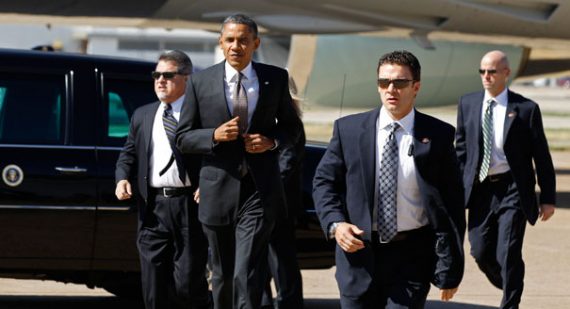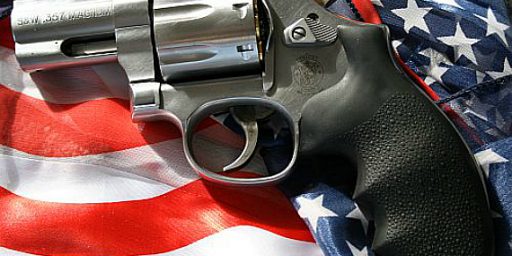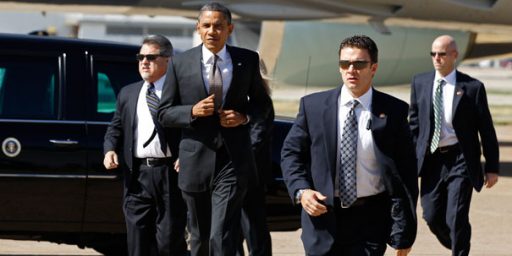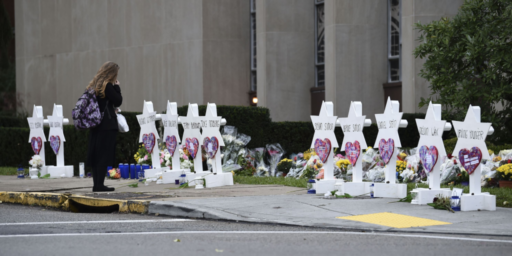New Report Finds Widespread Failures At The Secret Service
A new report finds that the problems at the Secret Service are far deeper than previously known.
A new report finds that serious problems still exist at the agency charged with protecting the President, Vice-President, and other top level members of the Federal Government and their families:
A man masquerading as a member of Congress walked into a secure backstage area without being properly screened and spoke with President Obama at an awards dinner last fall. Five days later, a woman walked backstage unchecked at a gala dinner where Obama was a featured guest. Months after that, two people strolled unnoticed past a Secret Service checkpoint into the first layer of the White House grounds.
The incidents were among a half-dozen previously undisclosed security breaches since 2013 that were detailed in an extensive, bipartisan congressional investigation of the inner workings of the Secret Service.
In a critical report to be released publicly Thursday, House investigators describe the once-elite force as an “agency in crisis” that has failed to fix many of the deeply ingrained problems exposed last year amid a string of humiliating security lapses, according to a copy of the report obtained by The Washington Post.
The report offers detailed assessments of the failings of the Secret Service during several well-publicized security incidents, including the agency’s halting response to a 2011 shooting at the White House and an incident last year in which an armed man with an arrest record was able to board an elevator with Obama.
More broadly, the report assessed the Secret Service as an agency that remains deeply troubled, despite recent attempts at reform. It concludes that the service has a “staffing crisis,” with fewer personnel today than in 2014, when an administration panel recommended adding 280 new staff members and Director Joseph P. Clancy took over vowing to enact the reforms.
“The agency’s recent public failures are not a series of isolated events, but the product of an insular culture that has historically been resistant to change,” states the report, compiled by the Republican and Democratic staffs of the House Committee on Oversight and Government Reform.
The staffing decline, which includes the uniformed-officer division that guards the White House, is “perhaps the greatest threat” to the Secret Service, the report says. Among other factors, the report points to past budget cuts and “systemic mismanagement” by the agency.
Although Clancy assured lawmakers earlier this year that there were “no greater priorities” for him than hiring the right number of staff, the agency’s roster has dropped from 6,367 full-time employees at the end of September 2014 to 6,315 one year later — its lowest point in a decade.
Morale is “critically low,” contributing to a drop in personnel through attrition. The report also blames the decline on an inefficient hiring process that hampers recruitment of high-caliber staff.
“The high attrition rate means that the personnel who remain are significantly overworked, and morale is at an all-time low,” the report says. The report also warns that the agency’s new hiring system “overburdens USSS with low quality applicants.”
The report also warns that Obama and 2016 presidential candidates face heightened danger if the administration does not swiftly fix the agency’s problems.
Rep. Jason Chaffetz (R-Utah), chairman of the Oversight Committee, said the report should spur further action by the Obama administration.
“The situation is getting worse not better,” he said. “The president is in jeopardy, and he better personally get involved in fixing this.”
The report includes new details about incidents we’ve heard about in the past, as well as some that have never before been reported publicly:
The most dramatic finding involved new details surrounding an incident at the Congressional Black Caucus Foundation’s awards dinner in Washington on Sept. 27, 2014, in which a man gained entry by posing as Rep. Donald Payne Jr. (D-N.J.). The man got backstage past a distracted Secret Service staffer and then was escorted to meet and talk with Obama. The impersonator’s entry to the event was reported at the time but not that he got so close to the president.
That incident came just days after a knife-wielding fence jumper had been able to race into the East Room of the White House. And it followed another high-profile breach, when an armed Centers for Disease Control and Prevention contractor with an arrest record was able to step onto an elevator and stand within arm’s reach of Obama.
The new investigation also found that in October 2014, a day after Julia Pierson resigned under fire as director, a woman got backstage at the Congressional Hispanic Caucus Institute’s gala being attended by the president.
Seven days later, the House inquiry found, an employee was allowed to enter a Los Angeles hotel where Obama and senior adviser Valerie Jarrett were staying without being properly screened for weapons or having his bag checked.
Other previously unreported episodes affected other officials.
In April 2013, four people went fishing on a small lake in the back yard of Vice President Biden’s Delaware home and were not discovered until neighbors called the Secret Service to report the security breach. The alarm system at Biden’s home had been failing for some time.
In spring 2014, a Czech citizen with an expired visa entered the property of former president George H.W. Bush and stayed for an hour without being detected.
The report blasted Secret Service officials in several instances for failing to examine its own mistakes and asserted that Clancy and some of his predecessors had provided Congress with information that was false and misleading about the extent of problems.
The report said Clancy gave inaccurate information about the incident involving the man on the elevator with Obama when he said no other armed security contractors came within close proximity to the president. But an internal review of the breach suggested that there were several unscreened and armed guards in the area.
The report noted that after the Secret Service took four days to discover that bullets from the November 2011 shooting had struck the White House residence, the agency’s inspection team did not immediately open a file on the case. The division instead opened a file in October 2014, only after a Post report the previous month detailed the agency’s handling of the incident, the report says.
(…)
The report cited a number of colorful e-mail exchanges between Secret Service staff suggesting that arranging liaisons with prostitutes was a widely known and accepted practice. Before the Colombia trip, one senior supervisor e-mailed 54 employees, cracking that the motto of the trip was “Una Mas Cerveza Por Favor,” Spanish for “one more beer, please.” In another note, an agent wrote to a colleague, “Swagg cologne-check/Pimp gear-check/Swagg sunglasses-check/Cash for dem hoes-check.”
The report said that the openness of the communication indicates that the Secret Service employees “did not believe their misconduct would be punished.”
There has been, of course, a seemingly unending series of failures on the part of the Secret Service that have become public knowledge over the past several years. To some degree, it seems as though the reports of these incidents began getting worse after we learned in 2012 about the scandal involving members of the Secret Service who were advocates of an advance team sent to prepare for a Presidential visit to Colombia who were caught soliciting prostitutes. Since then, there have been repeated incidents of individuals jumping the White House fence, including the individual noted above who managed to get all the way to the East Room of the White House, albeit while no members of the First Family were at White House. Last year, we learned that someone with a criminal record whose background had not been checked managed to get on an elevator with President Obama during a visit to the Centers for Disease Control in Atlanta. Perhaps most importantly, though, are the reports of long-standing morale problems that have been an issue at the agency dating back before the Obama Administration. Fortunately, none of the incidents that are detailed here resulted in any harm to the President or any other person under Secret Service protection, and it’s not clear that nay of the breaches created any real danger either. That, however, may just be a matter of luck rather than anything else. Failure of a security check that puts someone in close proximity to a protectee could easily lead to someone being harmed, that’s why the checks are supposed to be in place in the first place. If the checks aren’t working, and the people working at the agency are demoralized, then the prospect for something truly horrific increases just a little bit more, and that’s a potentially serious concern in an era where one-off terrorist acts and people just doing things with weapons seemingly randomly and out of the blue has becoming much more common.
Fixing the problem, of course, requires diagnosing what the real problems are. As they did when the agency was in a crisis last year that led to the resignation of the director of the Secret Service, many will make the argument that Congress is not adequately funding the agency. The problem with that theory is that Congress actually has funded the agency at a higher level than was requested by the White House in the years since sequestration went into effect. One thing that is notable is the fact that overall employment at the agency has declined, and while this apparently hasn’t affected the elite division charged with protecting the President, Vice-President, Cabinet Members, and candidates for President who request and are granted protection, it does arguably stretch resources in other areas that may overburden positions such as the uniformed division charged with protecting the White House grounds. Why the employment level has declined isn’t entirely clear, though. Finally, as I’ve noted before, it has been suggested by some veteran and former agents that the Secret Service’s decline can be traced in some sense to the decision to remove it from the Treasury Department, of which it had been a part since being established in 1865 in the wake of the assassination of President Abraham Lincoln, and make it another division of the Department of Homeland Security. The argument, apparently, is that the agency’s status at Treasury gave it an air of special status that helped morale somehow. I suppose that’s possible, but it strikes me that the defects that this and other reports have uncovered go far deeper than the issue of which member of the Cabinet the Director of the Secret Service reports to. Whatever the explanation, it seems fairly clear that there’s something deeply wrong at this agency and that someone needs to address it before the next security slip up ends up being more than just something that leaves a little egg on the face of a once-elite agency.







Big government = big corruption and mind numbing incompetence. Doesn’t matter whether you’re talking about this agency, that agency or the other agency. DOJ. DOE. VA. DHS. Treasury. NLRB. Secret Service. Nature of the beast. The more money you throw at them, the worse they get. It’s also the ongoing further Chicagoization of the entire federal government. Just wait until they have all of healthcare. You ain’t seen nothing yet.
Plus how much morale could this group realistically have given their present charges? Imagine what they’ve seen and know but what the public doesn’t. Obviously that doesn’t excuse anything about this rank scandal, though. Ultimately it all comes back to the ills of government bureaucracies and spending too much public money for too little real value.
@Bill Lefrak:
So, you’re saying that the President would be safer if there were no Secret Service?
No? Then what the @#$% are you saying? Do you even know?
@Bill Lefrak:
Show me a single, large-scale human endeavor that isn’t riddled with corruption. From the Catholic Church covering up child abuse, to corporate fraud, to $500 hammers in the army — corruption is simply the price you pay for any significant group of people working together. Someone is always trying to game the system. It is human nature.
When you are attacking an entity’s existence because of corruption, you are acknowledging that you have no other arguments.
I mean, sure, you should want to reduce corruption, but there are limits to that, and expenses to that, and you have to balance the costs of corruption against the costs of the anti-corruption efforts (including the costs of corruption within those efforts)
@Gustopher: I’m pretty sure the $500 hammers were the result of black ops funding..